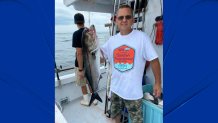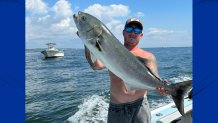When you think of polygraph examinations, crime comes to mind.
But the tests are being used to fish out potential cheaters in a Connecticut-based bluefish tournament.
Is the test fair? Some local fishermen don’t think so.
Tim Vallee of Terryville reeled in a memorable 15.18-pound bluefish in August.
Get top local stories in Connecticut delivered to you every morning. >Sign up for NBC Connecticut's News Headlines newsletter.

His catch was a memory he and his fishing buddies from the Waterbury Deep Sea Fishing Club will never forget.
“I was feeling very lucky,” Vallee said.
The club chartered the Tartan II out of Niantic to compete in “The Greatest Bluefish Tournament on Earth” in 2023.
The 41-year-old tournament has drawn thousands of anglers into the Long Island Sound on a summer weekend.
While it’s been months since Vallee caught that bluefish, he and the club members remember it like yesterday.
They showed NBC CT Responds consumer reporter Caitlin Burchill where they were all positioned on the Tartan II when Vallee reeled in the big one.
“Kevin was fishing to my left. Rick was fishing to my right. Chris was standing over there,” Vallee said.
He and the members say seven people witnessed him land the fish on his own.
“It was a big fish,” said Mike Stepski, the captain of the Tartan II.
It’s a tournament Stepski has participated in for decades.
“We were so excited to finally get a win because we've been, I’ve been doing this tournament since I was a little kid,” Stepski said.
Vallee’s catch on the Tartan II put him in second place on the leaderboard, but his bragging rights and dreams of a $7,500 prize did not last long.
It was almost two weeks later when I got a letter that says I was disqualified.
Tim Vallee
The tournament rules state "First, second, and third prize winners are required to take and pass a polygraph test."
Vallee failed the test.
Benny Sheen’s in the same boat.

The Long-Islander failed the polygraph too, disqualifying him from winning $25,000 for first place.
Sheen caught the more than 20-pound fish aboard his friend's boat.
“From the get-go, people didn't believe it just because it was a very large fish. Anyone could have caught that fish. We were fishing next to 250 boats in the middle of everybody. It wasn't like we did anything different,” Sheen said.
During The Greatest Bluefish Tournament on Earth, local tackle shops must verify the weight and condition of the fishermen’s catches, but then there’s the lie-detector test.
Both men say they weren’t told any other reason for their disqualifications other than learning they failed the exam.
Connoisseur Media’s radio group runs the fishing tournament.
General manager Kristin Okesson told NBC CT Responds in part, “We take great pride in upholding the rules that govern the competition,” which includes catching fish within the specified timeframes and within clearly defined boundaries.
The captains of the boats that Vallee and Sheen were on say both men legitimately reeled in their big catches in bounds.
“We have it on video. The pictures, everything he did. He gets disqualified. I don't know,” said Zac Auer, who was captaining the boat Sheen was on during his catch.
“I run the boat. I told him the position where we caught the fish. We have everybody in the boat (who) witnessed the catch. For some reason, he failed the lie-detector test, and I don’t even understand how that is possible,” Stepski, Vallee’s captain, said.
“It’s a well-established tradition to polygraph top potential winners,” Okesson said.
She said before the 2023 season just one angler had ever been disqualified during her involvement with the tournament.
NBC CT Responds reached out to Charles Morgan for his expert opinion on using a polygraph to verify the results of a fishing tournament.
The University of New Haven professor said he does not think it’s a good way to sniff out a cheater.
“If I were in their shoes, I'd challenge that. I wouldn't accept that,” Morgan said of Vallee and Sheen’s disqualifications.
The forensic psychiatrist studies the detection of deception and he’s a former CIA intelligence officer.
“The polygrapher is going to interpret any anxiety reaction as a sign of lying and so that could genuinely raise the heart rate or the blood pressure, the skin conductance and make them look like a liar when in fact, it could be the normal worry that someone has,” Morgan said.
“The problem with that kind of a test is that you have lots of chances to look guilty when you're not,” he continued.
And that’s why he says the results of these tests are not admissible as evidence in court in Connecticut.
“You're telling other people that I'm a dishonest person, and you've used a nonscientific and invalid scientific device,” Morgan said.
“Who wants to be called a liar when you know you were doing the right thing, you know?” Sheen said, reflecting on his disqualification.
“What do my children think? They think I was lying? What does my family think? You know? I think it casts doubt on my integrity,” Vallee said.
Lisa Ribacoff, the administrator of their polygraph tests, said in an email whatever the validity in court, it’s part of tournament rules to use polygraphs to verify the results.
Okesson, the GM of the radio group that runs the tournament, told NBC CT Responds that “If someone does not pass the test, we provide them with every opportunity to retake it, even in cases of conclusive failure,” as long as the participants make themselves available before the final deadline.
However, in emails provided to us by Vallee, he asked to retest multiple times but was told he couldn’t contest his results.
“It's a little fishy, to be honest…how they didn’t offer him a second one,” said Sheen, who was offered a second polygraph test.
But Sheen was unable to coordinate a retest date with the radio station by their deadline.
His polygraph was on Sept. 26. He learned he failed the next day.
In emails provided to us by Sheen, tournament organizers wanted him to retake the test by Sept. 29.
He tells us he was never able to coordinate a second test in time with his work schedule.
“All I needed was a couple of days to let my boss know I needed a day off for this. They pretty much were like, ‘No, you're disqualified if you can't come today,’ like you know, and I was like, ‘What?’” Sheen said.
Sheen told NBC CT Responds something the polygraph examiner told us, too - the scheduling of the tests was disorganized.
Okesson told NBC CT Responds that “the clarity of our rules [has] contributed to very few issues."
But both anglers we spoke to swear they’re not spinning fish tales.
“Catching the fish seems to be the easy part. Passing that polygraph test is the hard part,” Vallee said.
Okesson told NBC CT Responds Vallee’s disqualification also had to do with his social media, but wouldn’t tell us what exactly.
There’s a clause in tournament rules that reserves them the right to disqualify anyone violating rules, but there’s no mention of social media in the tournament rules.
Vallee says he had never been told an aspect of his social media had to do with his disqualification until he heard it from NBC CT Responds.
The letter he received from the tournament about his disqualification only mentioned his failed polygraph test.
Vallee is adamant he followed all of the rules.
The Waterbury Deep Sea Fishing Club agrees and says it won’t compete in the tournament again.
Because of Vallee and Sheen's disqualifications, the third and fourth finishers on the leaderboard ended up as first and second-place winners.
Tournament organizers tell us they have full confidence these anglers adhered to all the rules.
Remember the captain of Sheen’s boat, Zac Auer?
Auer was an official fourth-place winner of The Greatest Bluefish Tournament on Earth in 2023.
He was sent a check prize from the tournament, despite Sheen’s disqualification.
Two others on his boat placed in the top 10 too.
According to tournament rules, anglers who place below third do not have to take a polygraph to claim a prize.



